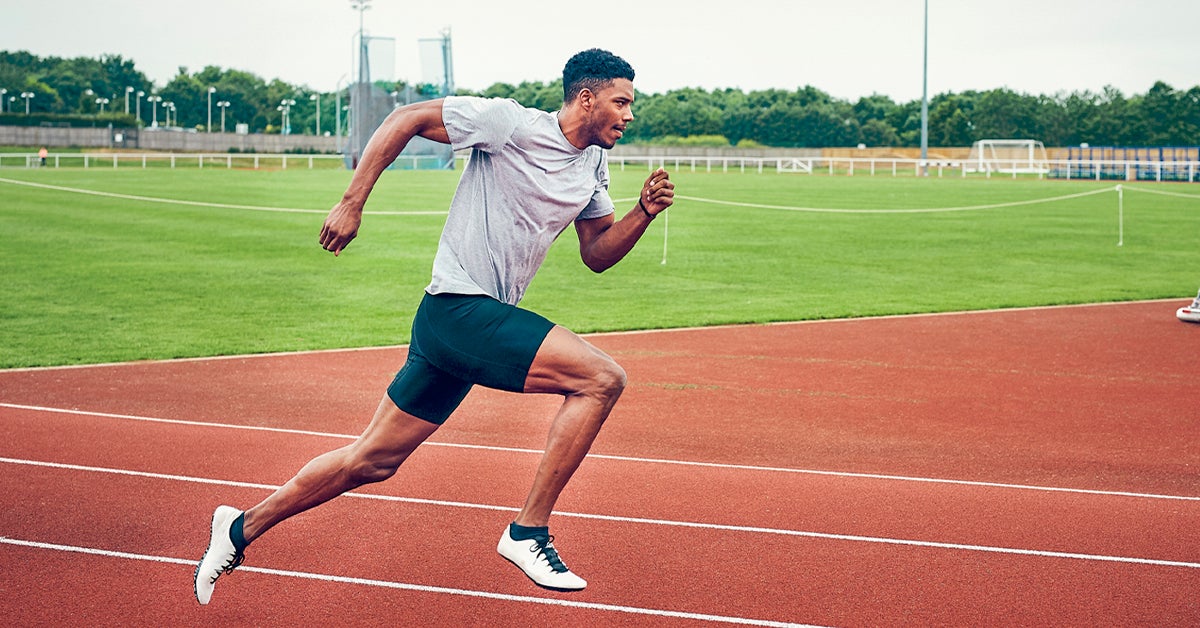Have you ever stopped to wonder about the very first time someone went for a run? It's a pretty common thought, that, and it often leads people to think there must have been a single moment, a particular person who just, you know, came up with running. But the truth is, running wasn't something cooked up by one person at all. It's a movement, a way of getting around, that has been with us for a very, very long time, changing and growing right alongside human beings over millions of years.
It's a natural thing we do, sort of like breathing or walking, really. This ability to run, it didn't just appear out of nowhere. Instead, it slowly took shape as our ancestors moved through their lives, learning new ways to get from one place to another. So, if you're picturing someone in ancient times suddenly deciding, "Hey, I'm going to invent running today!" you might be a little off the mark. It's much more of a story about slow, steady development.
What started as a simple need, like getting food or getting away from danger, gradually turned into something much bigger. It became a sport, a way to keep fit, and even a part of celebrations and daily routines for many people around the globe. This article will help us think about this long, winding path, from those earliest steps to the races we see today, exploring how this fundamental human act came to be what it is for us now, and actually, why we say running was never truly invented.
- Verses About Renewal
- Curiosity Quotations
- Engagement Wishes For Daughter
- Film Quotes About Life
- Baby French Girl Names Meaning Blue
Table of Contents
- Did Someone Invent Running?
- How Did Early Humans Start Running?
- Running's Long History - More Than Just a Pastime
- How Did Running Become a Sport?
Did Someone Invent Running?
When we talk about things being "invented," we usually think of a specific person, maybe someone like Thomas Edison and the lightbulb, or Alexander Graham Bell and the telephone. But when it comes to running, there isn't a "Mr. Thomas Running" who started the whole thing, you know? It's a common question, yet the answer is quite different from what we might expect for something so fundamental to human experience. It's a bit like asking who invented breathing, in a way. Running is something so deeply ingrained in what it means to be human that it feels more like a discovery of an ability than a creation from scratch. It's actually a natural talent that has been with us for a very, very long time, changing and growing as we did.
So, the simple answer is no, nobody sat down and decided to invent running. Instead, it's something that came about through a long process of human change and adaptation. Think about it: from the moment we are very small, we learn to crawl, then to walk, and then, quite naturally, to run. It's a progression, a way our bodies move that feels almost instinctive. This ability to move quickly on two feet has been a part of us for millions of years, shaping how we live and how we get around. It's pretty clear that our earliest ancestors were doing some form of running long before anyone thought to write down history or keep records of such things. This idea that running was invented by a single person just doesn't fit with what we understand about human development and our bodies.
The Idea of Running Invented by Evolution
If we have to put a label on how running came to be, it's more accurate to say it was "invented" over the course of human evolution. This means it wasn't a sudden event, but a very slow unfolding, a gradual development that happened as our bodies changed over countless generations. When our early human relatives first began to stand upright and move on two legs, that was a huge step, you know? This ability, called bipedalism, set the stage for running. It gave them a new way to move, a way that was more efficient for covering long distances.
- Who Is Khloe Kardashian Baby Daddy
- Baby Shank
- What Is The Happiest Demographic
- Tracy Morgan Dead
- How Old Is Katy Tur
Scientists who study how living things change over time believe that the ability to run for extended periods probably developed around 2.6 million years ago, or maybe even as far back as 4.5 million years ago. This wasn't because someone decided it would be a fun hobby, but because it was a matter of survival. Being able to run fast and far gave our ancestors a real advantage. They could chase after animals for food, or they could escape from things that wanted to eat them. So, in a very real sense, the need to survive pushed our bodies to get better at running, shaping our bones and muscles in ways that made this quick, sustained movement possible. This makes the "running invented" story a tale of natural selection and adaptation, rather than a human creation in the usual sense.
How Did Early Humans Start Running?
Imagine our very, very early ancestors, millions of years ago. They weren't just sitting around, of course. They were moving, looking for food, trying to stay safe. Fossil discoveries give us clues about these ancient human relatives, showing us how their bodies began to change. One of the biggest changes was learning to walk upright on two legs. This might seem simple, but it was a truly big deal. Once they could walk on two feet, their hands were free to carry things, and they could see further over tall grasses. This standing-upright ability was the first step, so to speak, toward running. It set the stage for the kind of movement that would become so important later on.
From walking upright, it was a pretty natural progression to running. Think about how a child learns: they walk, then they start to run. For early humans, this quicker movement offered clear benefits. It wasn't about winning a race, but about staying alive. They needed to cover large areas to find food, like animals to hunt or plants to gather. And sometimes, they needed to get away from dangerous creatures. Running gave them the speed and endurance to do these things more effectively. It was a tool, a very powerful one, for living day-to-day. So, when we ask how early humans started running, it boils down to basic needs and the way their bodies adapted to meet those needs over vast stretches of time.
When Was Running Invented for Survival?
If we think about running as something "invented" for a specific purpose, then that purpose was absolutely survival. Evolutionary biologists, who study how life forms change over time, suggest that this ability to run for long distances, sometimes called persistence hunting, became a key part of human life about 2 to 3 million years ago. It was a time when our ancestors were living on open grasslands, and being able to run down prey, or run away from predators, was a truly important skill. This meant running wasn't just a casual activity; it was a necessary part of getting enough to eat and avoiding being eaten yourself.
Consider the benefits: chasing an animal until it got tired, or making a quick escape from a threat. These actions were directly linked to whether an individual or a group survived. The human body, over generations, became quite good at this. Our unique ability to sweat, for example, helped us keep cool while running for long periods, something many other animals can't do as well. This gave us a distinct edge. So, the "running invented" story, in this context, is really about our ancestors figuring out, through trial and error over millions of years, that moving quickly and for a long time was a really good way to stay alive and thrive. It was less about a single moment of creation and more about a very long period of biological fine-tuning for a vital purpose.
Running's Long History - More Than Just a Pastime
While running started out as a way to survive, it didn't stay just that. As human societies grew and changed, so did the role of running. It began to take on other meanings, becoming something more than just a means to an end. We find hints of this transformation in very old records and art. For example, there are cave paintings from thousands of years ago that seem to show people running, perhaps in a ceremonial way or as part of a group activity. And in ancient Egypt, there's evidence of foot races, which tells us that even back then, people were running for reasons beyond just getting food or escaping danger. This suggests that running, even in those very early times, was starting to become a part of culture, something people did for fun, for competition, or as a way to honor something important.
Running's journey from a basic survival skill to something celebrated and practiced for its own sake is a long and interesting one. It shows how something so fundamental to our nature can also adapt and gain new purposes as human life evolves. It's not just about the physical act of moving your legs quickly; it's about what that movement means to people, how it connects them to each other, and how it fits into their shared way of life. This shift from pure necessity to a more varied role is a big part of running's story. It's pretty clear that humans have always run, but the reasons for doing so have certainly expanded over time, making it a truly rich part of our collective experience.
The Path of Running Invented as a Cultural Act
As communities became more settled and organized, running began to be "invented" again, in a way, but this time as a cultural act. It moved from being purely practical to having symbolic meaning. Think about religious festivals in various parts of the world; competitive running often grew out of these events. People would race not just for personal glory, but as a way to honor gods, celebrate harvests, or mark important transitions. These early races weren't just about who was fastest; they were about community, tradition, and shared beliefs. They brought people together and gave them a common purpose, a bit like how many traditions work today, you know?
This shows how running, which started as a biological advantage, became something that people actively shaped and gave meaning to. It became a way to show strength, skill, and dedication. It was incorporated into stories, myths, and rituals. This transformation meant that running was no longer just about survival; it was about identity, about belonging, and about expressing something about human spirit. The history of running, then, is deeply woven into the larger story of human culture, showing how a simple act can become a powerful symbol. This process of giving new meaning to an old ability is, in a sense, how running was "invented" as a cultural phenomenon, evolving far beyond its original, practical roots.
How Did Running Become a Sport?
The journey of running from a survival tool to a globally recognized sport is a fascinating one, and it certainly wasn't a quick change. For a very long time, running was just something people did. But then, in some places, people started to organize it, to make it a competition with rules and winners. The ancient Greeks and Romans played a really big part in this. They were instrumental in formalizing running, turning it into something more structured. They organized events that highlighted competitive running, which, you know, laid a clear foundation for what we now think of as modern athletic competitions. These early organized races were a significant step in running's evolution from a simple activity to a recognized sport.
The Olympic Games, which started in ancient Greece, are a prime example of this formalization. Running events were central to these games, and they were a huge deal. Athletes would train specifically for these races, and winning brought great honor. This kind of organized competition helped to spread the idea of running as a sport, something distinct from just running to get somewhere or to hunt. It created a framework for how races would be run, how winners would be determined, and how records might be kept. This shift from informal foot races to highly organized athletic events was a very important moment in running's long history, shaping how we view and participate in it today.
The Formal Side of Running Invented
When we talk about the "formal side of running invented," we're really looking at the period when people started to set rules, create events, and turn running into a recognized athletic pursuit. This wasn't about creating the act of running itself, but about creating the *sport* of running. The ancient Greeks, for instance, didn't invent putting one foot in front of the other quickly, but they certainly "invented" the concept of a structured footrace within a larger festival like the Olympics. These events had specific distances, starting lines, and finishing lines, and there were judges to ensure fairness. This kind of organization was a big step, creating a clear path for running to become a formal sport.
This formalization continued through history, adapting and changing over centuries. From those early Greek games to the modern marathons and track events we see today, the structure and rules of running competitions have been refined. This means that while running as a basic human movement was never "invented," the way we participate in it as a sport, with its specific rules, events, and global reach, certainly was. This structured approach to running has influenced human culture, health, and sport throughout history, making it a phenomenon that is much more than just putting one foot in front of the other. It’s a clear example of how a natural ability can be shaped and given new meaning by human creativity and organization, giving us the "running invented" as a competitive spectacle.
- Pape Francois Net Worth
- Curiosity Quotations
- Good Evening Evening
- Who Is Hugh Jackmans Daughter
- Son And Stepmother



Detail Author:
- Name : Lisa Zemlak III
- Username : berneice.bergstrom
- Email : schimmel.sheldon@hotmail.com
- Birthdate : 2000-11-27
- Address : 727 Fadel Valley East Rowlandmouth, NJ 91811
- Phone : +1-279-364-4050
- Company : Ankunding-Abbott
- Job : Bailiff
- Bio : Non earum aut et fugit commodi accusamus corrupti. Quod quibusdam magni at qui deleniti eum qui. Sapiente dignissimos aut magni qui et animi adipisci.
Socials
tiktok:
- url : https://tiktok.com/@baumbachm
- username : baumbachm
- bio : Dolorem maxime quia velit facilis tempore et debitis.
- followers : 4310
- following : 2680
linkedin:
- url : https://linkedin.com/in/maximo_real
- username : maximo_real
- bio : Consequatur ut quia eaque ratione.
- followers : 1175
- following : 2022
